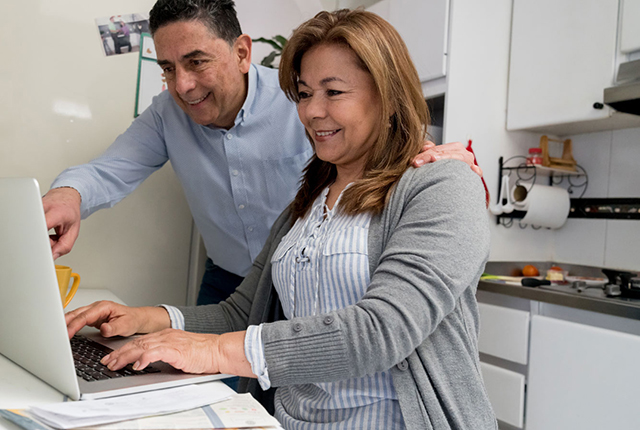Patient Education
Becoming familiar with head and neck cancers and treatment involves learning a new vocabulary. We support you with a guide to head & neck cancer terminology and other resources. Some common terms you are likely to hear during your treatment experience include:
The process of removing tissue using various forms of energy.
A growth that typically does not invade surrounding tissue or spread to other areas of the body. These tumors are NOT cancer.
The process of sampling a small portion of tissue to evaluate for cancer.
A scan that produces 3D images of the inside of the body using X-rays.
A physician who surgically removes tumors of the head and neck.
A tumor with the potential to invade surrounding tissue or spread to other areas of the body. Malignant tumors are synonymous with cancer.
A physician who prescribes anti-cancer medications, such as chemotherapy or immunotherapy.
A scan that produces highly detailed 3D images of the inside of the body using magnets and a computer. There is no radiation.
A scan that uses an injected dye to highlight areas of tumor activity within the body.
A physician who administers focused radiation energy to treat cancers.
A physician who reads and interprets imaging studies, such as CT scans and MRI scans.
Using surgery to restore function and form after a tumor has been removed from the head and neck.
A physician who performs reconstructive surgery.
The process of monitoring for cancer recurrence following treatment.
A weekly conference attended by our entire head and neck cancer team where patient cases are carefully reviewed, and treatment plans are created with the expertise of many physicians.
Patient Resources
For more than 30 years, the Integrative Medicine program has been dedicated to providing support, education and hope to those impacted by cancer. Orlando Health provides this program for everyone affected by cancer in the Central Florida area.
The Integrative Medicine program’s goals perfectly complement Orlando Health’s goals: To ensure that all people impacted by cancer are empowered by knowledge, strengthened by action and sustained by community. The program addresses the social and emotional health of patients of all ages at any point in their cancer journey to ensure no one has to face cancer alone. It offers a network of personalized services and education at no charge to all affected by cancer.
Learn more about the Orlando Health Cancer Institute Integrative Medicine program.
Genetics play a major role in 5-10% of all cancers, according to the National Cancer Institute. The Genetic Counseling Program at the Orlando Health Cancer Institute is dedicated to helping you and your family learn about your potential risk for a hereditary form of cancer so you can make informed decisions about your healthcare.
We provide genetic counseling and testing to help individuals determine their risk for certain types of hereditary cancers and what steps they might need to take to manage those risks.
We believe that conventional western medicine is the best approach to combat cancer and other diseases, and that adding services that treat the whole person can enhance healing and well-being. The Integrative Medicine program engages patients and their families to become active participants in improving their physical, emotional and social health.
At Orlando Health, research-supported evidence based complementary approaches to symptom and distress management are available to patients who would like new approaches to their health management or who have already benefitted from them in the past.
Some of the supplemental therapies and practices we offer include:
• Acupuncture: Practitioners stimulate specific points on the body — most often by inserting thin needles through the skin.
• Oncology massage therapy: This practice includes many different techniques to manually manipulate the soft tissues of the body.
• Meditation: Most meditation techniques, such as mindfulness meditation or transcendental meditation, involve ways in which a person learns to focus attention.
• Relaxation techniques: Breathing exercises, guided imagery and progressive muscle relaxation are designed to enhance the body's natural relaxation response.
• Tai chi and qi gong: These traditional Chinese medicine practices combine specific movements or postures, coordinated breathing and mental focus.
• Yoga: Used for health purposes, certain types of yoga typically combine physical postures or movement, breathing techniques and meditation.
• Hypnotherapy: This type of therapy is used to reprogram the subconscious mind, which can be useful for behavior modification and controlling emotions.
In addition, the Orlando Health Cancer Institute offers activities that allow the patient to take a break from the daily pace of life in a soothing space. High Tea in the British tradition is served in elegant bone china cups each week. Another European custom is the labyrinth on the 4th floor of the Charles Lewis Pavilion that is modeled after the one at Chartres Cathedral near Paris, France. The labyrinth is an ancient healing tool used as a walking meditation or embodied prayer.
If you would like more information, or a complete list of services please contact the Integrative Medicine Department at (321) 841-5056 or email [email protected].
The Clifford E. Graese Community Health Library offers print and multimedia resources on:
- Disease-specific information
- Symptom management
- Psychosocial support
- Coping with a cancer diagnosis
You can check out health information materials as well as popular paperbacks for leisure reading.
A cancer diagnosis can be an overwhelming experience. That’s why we provide personal nurse navigators. Nurse navigators establish and maintain communication between patients, families, physicians and the healthcare system. Your nurse navigator will stay with you throughout your entire cancer journey, assisting you with entry into the cancer care system and identifying any barriers that may exist.
The licensed registered dietitians at the Cancer Institute work with your care team to support your nutrition needs before, during and after treatment. Services provided include:
- Personalized meal planning
- Education on how to eat healthy for cancer prevention
- Instruction on how to use vitamins, minerals and herbal supplements in cancer care
- Management of side effects related to cancer treatment
- Temporary tube feeding for nutritional support during treatment
- Follow-up care for continued healthy living after treatment
This practice includes many different techniques to manually manipulate the soft tissues of the body.
Click here to learn more about our Oncology Massage Therapy.The Patient and Family Counseling Department at the Cancer Institute provides educational programs, support groups and counseling for patients and their families.
Navigate Your Health


Find a Cancer Physician
Find a Cancer Physician
Meet our doctors who specialize in the full range of cancer care. Our team of experts has experience in a variety of specialty areas. Together, we provide comprehensive evaluation, diagnosis and treatment options.
Learn More

Patient Portal
Patient Portal
If you are a patient at Orlando Health Cancer Institute, our free online patient portal provides an easy and secure way to manage your health information. Reach us from any location at a time that’s convenient for you.
Learn More

Virtual Visit
Virtual Visit
Need to talk with a doctor, but don’t want to leave your home? Try our virtual visit (telehealth) option to connect with a physician from your phone, tablet or computer.
Learn More
